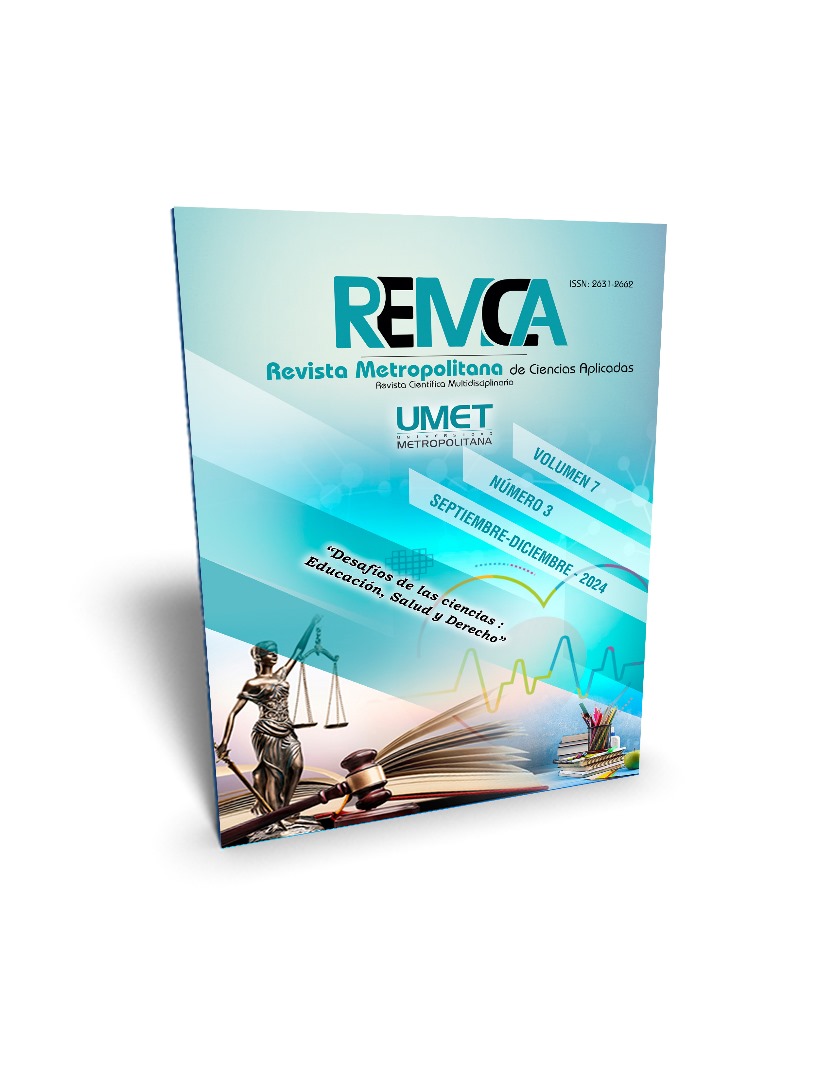Impossibility of filing a counterclaim regarding food and the principle of procedural economy
DOI:
https://doi.org/10.62452/59cmb683Keywords:
Counterclaim, food processes, principles associated with counterclaim, accumulation of claimsAbstract
The General Organic Code of Procedures in Ecuador, which regulates the procedures for the processing of non-criminal matters, establishes in its article 154 that counterclaims are not applicable in matters of food, which has given rise to numerous debates in practice about the inconvenience that as a result of its interpretation, several processes have to be promoted to resolve issues related to the measures that must be adopted with respect to the children when the plaintiff in the process only requests that alimony be established. Based on a thorough bibliographic review and the application of theoretical and legal methods that served as a basis for the analysis and interpretation of the doctrine, jurisprudence and national and international legislation, the position is taken to consider that in the processes derived from the rights of minors, based on the protection that the family jurisdiction must offer due to the nature of the process and the best interests of the child, judges must provide solutions to the measures of food, visits, custody and care that arise from the process without the counterclaim being enforceable, as long as the decision does not imply surprise or defenselessness for the plaintiff or the defendant.
Downloads
References
Cano, O. (2024a). El Especial Tratamiento de la Reconvención en los Procesos de Familia. https://www.oscar-cano.com/el-especial-tratamiento-de-la-reconvencion-en-los-procesos-de-familia/
Cano, O. (2024b). La Reconvención en los Procesos de Familia. https://www.oscar-cano.com/la-reconvencion-en-los-procesos-de-familia/
Echandía, D. (2013). Teoría General del Proceso. Universidad .
Ecuador. Asamblea Nacional Constituyente. (2008). Constitución de la República del Ecuador. Registro Oficial No. 449. https://www.oas.org/juridico/pdfs/mesicic4_ecu_const.PDF
Ecuador. Asamblea Nacional. (2009). Código Orgánico de la Función Judicial. Registro Oficial Suplemento 544. https://www.registroficial.gob.ec/index.php/registro-oficial-web/publicaciones/suplementos/item/4134-suplemento-al-registro-oficial-no-544
Ecuador. Asamblea Nacional. (2015). Código Orgánico General de Procesos. Registro Oficial Suplemento 506. https://www.ces.gob.ec/lotaip/2021/Marzo/a2/C%C3%B3digo%20Org%C3%A1nico%20General%20de%20Procesos,%20COGEP.pdf
Ecuador. Congreso Nacional. (2003). Código Orgánico de la Niñez y de la Adolescencia. Registro Oficial 737. https://www.igualdad.gob.ec/wp-content/uploads/downloads/2019/12/codigo_ninez_adolescencia_nov2019.pdf
Ecuador. Corte Nacional de Justicia. (2018). Resolución 04-2018. https://www.cortenacional.gob.ec/cnj/images/pdf/resoluciones/2018/18-04%20Fijacion%20de%20alimentos.pdf
Ecuador. Corte Nacional de Justicia. (2020). Absolución de Consultas. Criterio no Vinculante. https://www.cortenacional.gob.ec/cnj/images/pdf/consultas_absueltas/No_Penales/Procesal/188.pdf
Estados Unidos Mexicanos. Suprema Corte de Justicia de la Nación. (2011). Juicios Sumarios de Desocupación en el Código de Procedimientos Civiles del Estado de Jalisco. No está previsto el derecho a reconvenir. https://sjf2.scjn.gob.mx/detalle/ejecutoria/23108
Ilich Ignacio, L. (2021). Contestacion de Alimentos con Reconvencional. Chandia Muñoz. https://es.scribd.com/document/510590264/contestacion-de-alimentos-con-reconvencional-CHANDIA-MUNOZ-1
López Ochoa, M. (2023). Naturaleza Jurídica de La Reconvención. Novedades Jurídicas, (199), 6-18. https://edicioneslegales.com.ec/wp-content/uploads/2023/01/REVISTA-NJ199.pdf
Mendoza Medina, J. G., Bravo Castro, H., Falcones Ferrin, I. A., Buenaventura Navas, J. C., & Macías Párraga, J. O. (2017). Caso Civil que sigue Palma Palma Delly Beatriz contra Palma Palma José Virgilio: “Vulneración al derecho a la garantía básica del debido proceso en la sentencia dictada dentro la causa 13204-2014-4454”. (Trabajo de titulación). Universidad de San Gregorio de Portoviejo.
Montero Aroca, J., & Chacón Dorado, M. (2019). Manual de Derecho Procesal Civil. Tirant lo Blanch.
Morán Sarmiento, R. ( 2011). Derecho Procesal civil práctico. VLEX.
Morán Sarmiento, R. (2003). Derecho Procesal Civil. Publisher.
Navarro & La Rosa Abogados. (2015). ¿Es necesaria la reconvención para la modificación de la pensión alimentos? http://nlrabogadosalicante.com/divorcio-reconvencion-modificacion-pension-alimentos/
Palomo Vélez, D. (2008). La Oralidad en el Proceso Civil: El Nuevo Modelo Español. Librotecnia.
Quisbert, E. (2010). Apuntes de derecho procesal civil boliviano. USFX.
Rendón Garnica, V. (2016). Reconvención en demanda de alimentos para menor de tres años. https://www.youtube.com/watch?v=vZIob3HOzdk
Downloads
Published
Issue
Section
License
Copyright (c) 2024 Arianna Elizabeth Agila-Tibillin, Gabriela Alexandra Agila-Tibillin, Armando Rogelio Duran-Campo (Autor/a)

This work is licensed under a Creative Commons Attribution-NonCommercial-ShareAlike 4.0 International License.
Authors who publish in Revista Metropolitana de Ciencias Aplicadas (REMCA), agree to the following terms:
1. Copyright
Authors retain unrestricted copyright to their work. Authors grant the journal the right of first publication. To this end, they assign the journal non-exclusive exploitation rights (reproduction, distribution, public communication, and transformation). Authors may enter into additional agreements for the non-exclusive distribution of the version of the work published in the journal, provided that acknowledgment of its initial publication in this journal is given.
© The authors.
2. License
The articles are published in the journal under the Creative Commons Attribution-NonCommercial-ShareAlike 4.0 International License (CC BY-NC-SA 4.0). The terms can be found at: https://creativecommons.org/licenses/by-nc-sa/4.0/deed.en
This license allows:
- Sharing: Copying and redistributing the material in any medium or format.
- Adapting: Remixing, transforming, and building upon the material.
Under the following terms:
- Attribution: You must give appropriate credit, provide a link to the license, and indicate if any changes were made. You may do this in any reasonable manner, but not in any way that suggests the licensor endorses or sponsors your use.
- NonCommercial: You may not use the material for commercial purposes.
- ShareAlike: If you remix, transform, or build upon the material, you must distribute your creation under the same license as the original work.
There are no additional restrictions. You may not apply legal terms or technological measures that legally restrict others from doing anything the license permits.




